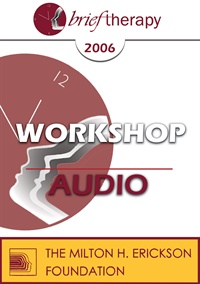BT06 Workshop 19 - Couples Workshops as a Form of Brief Therapy - Ellyn Bader, PhD, and Peter Pearson, PhD
- Average Rating:
- Not yet rated
- Topic Areas:
- Workshops | Brief Therapy | Couples Therapy
- Categories:
- Brief Therapy Conference | Brief Therapy Conference 2006 | Pioneers in Couples and Family Therapy
- Faculty:
- Ellyn Bader, PhD | Peter Pearson, PhD
- Duration:
- 2:38:13
- Format:
- Audio Only
- Original Program Date:
- Dec 09, 2006
- License:
- Never Expires.
Description
Description: Dive into an innovative approach to couples therapy with Ellyn Bader and Peter Pearson. Learn transformative techniques for creating safe, meaningful dialogues, focusing on trust, mutual accountability, and personal growth. Through practical exercises, personal stories, and powerful communication strategies, discover how to break negative patterns and build stronger, more resilient relationships. Ideal for therapists seeking to enhance their couples work with compassionate, effective interventions.
Syllabus Description: Couples in our society are very isolated from other couples and from "what is normal" in a relationship. Couples workshops provide a unique opportunity to de-mystify relationship stress and change destructive cycles quickly. Attendees will have an opportunity to experience effective exercises used in couple's workshops.
Educational Objectives:
- To describe how to develop an outline for a couples workshop.
- To describe a graduated series of exercises designed to create a positive interpersonal dialogue between high distress partners.
*Sessions may be edited for content and to preserve confidentiality*
Credits
Handouts
| Timestamped Transcript (1.1 MB) | 27 Pages | Available after Purchase |
| Timestamped Transcript (1.3 MB) | 33 Pages | Available after Purchase |
| Ericksonian Learning Snapshot (247 KB) | 2 Pages | Available after Purchase |
Faculty

Ellyn Bader, PhD Related Seminars and Products
Ellyn Bader, PhD, is a founder and director of The Couples Institute in Menlo Park, California. As a clinical psychologist, workshop leader, author, and speaker, she is dedicated to helping couples create extraordinary relationships. Over the past 30 years she has trained therapists in couples therapy throughout the United States as well as Europe, Asia, South America, and Australia. She served as a Clinical Faculty in Stanford University School of Medicine for 8 years.

Peter Pearson, PhD Related Seminars and Products
Peter Pearson, Ph.D., has specialized in helping couples transform their relationships. He and his wife, Dr. Ellyn Bader are pioneers in the field of couples therapy, creating The Developmental Model of Couples Therapy and founding The Couples Institute long before couples therapy was recognized as a specialty. As a therapist, workshop leader, author, and speaker, Pete is dedicated to helping couples create extraordinary relationships. He and his wife have been featured on over 50 radio and television programs including “The Today Show” and “CBS Early Morning News.”


